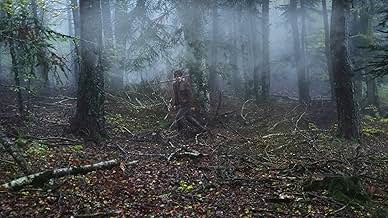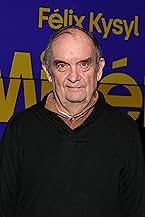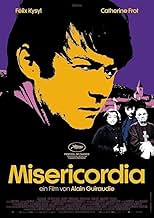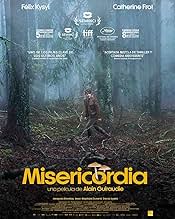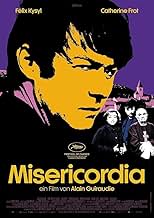Miséricorde
Returning to Saint-Martial for his late boss's funeral, Jérémie's stay with widow Martine becomes entangled in a disappearance, a threatening neighbor, and an abbot's shady intentions.Returning to Saint-Martial for his late boss's funeral, Jérémie's stay with widow Martine becomes entangled in a disappearance, a threatening neighbor, and an abbot's shady intentions.Returning to Saint-Martial for his late boss's funeral, Jérémie's stay with widow Martine becomes entangled in a disappearance, a threatening neighbor, and an abbot's shady intentions.
- Awards
- 4 wins & 20 nominations total
Luis Serrat
- Petit rôle
- (as Lluis Serrat)
- Director
- Writer
- All cast & crew
- Production, box office & more at IMDbPro
Featured reviews
The film's qualities are manifold. A script whose progression we never guess at, which keeps the viewer curious, imagining certain developments, some of which never come to pass. Subtle acting direction. Photography and sets that accentuate the drama. The absence of music, which lends permanent weight to all the images. The documentary element on mushrooms. Themes centered on the relationship between the characters: girlfriend, unrequited love, parent-child relationship, homoeroticism, but also humor bordering on parody and the ridiculous.
We understand that Guiraudie must admire Pier Paolo Pasolini's Théorème (1967), not for the universe, the bourgeoisie and the abstraction, but for the homoerotic possibilities. That said, we're not bored with Miséricorde.
Flaws: no empathy for the characters. We follow their evolution through the dramatic arc, but we're not concerned by what happens to them. The parish priest's dialogues at the end take the film away from naturalism and into the realm of the ridiculous or even Z-series, unless it's deliberate humor. But in the end, this is what makes the film so interesting: its constant navigation on the edge of the abyss of indecision and even ridicule, without falling into it.
We understand that Guiraudie must admire Pier Paolo Pasolini's Théorème (1967), not for the universe, the bourgeoisie and the abstraction, but for the homoerotic possibilities. That said, we're not bored with Miséricorde.
Flaws: no empathy for the characters. We follow their evolution through the dramatic arc, but we're not concerned by what happens to them. The parish priest's dialogues at the end take the film away from naturalism and into the realm of the ridiculous or even Z-series, unless it's deliberate humor. But in the end, this is what makes the film so interesting: its constant navigation on the edge of the abyss of indecision and even ridicule, without falling into it.
It wasn't until after I saw Misericorida that I looked up and found out that the director, Alain Guiraudie, also directed Stranger by the Lake. That was a very good film, principally since in many ways it had a much more compact theme and storyline than Misericorida.
What I found muddled about the film was the introduction of Félix Kysyl as the protagonist Jérémie Pastor. He comes back to town for the funeral of his old boss, yet it's never made clear when and why he and his family lived in the town and why they left. And then there is the whole gayness of what is - or isn't - going on. Some times it's subtle, some times very overt, especially towards the end. And here again, it is confuse about whether Jérémie is or isn't gay. Finally, there is the whole matter of Jérémie's intention - or not - to stay in town after the funeral. Yet, this of course is the underlying tension in the film. Along the way there are some eye rolling plot elements that you just have to look past.
With all that, the story moves along being alternately suspenseful, humorous and even sad. Kysyl is great as the lead. Then there is Catherine Frot as Martine, the grieving widow, and Jacques Develay as the village priest who both give great performances. And the scenery is specatular, making you want to go to France to be in the stunning countryside.
Overall, a good film that is not by the numbers yet also is not without its flaws.
What I found muddled about the film was the introduction of Félix Kysyl as the protagonist Jérémie Pastor. He comes back to town for the funeral of his old boss, yet it's never made clear when and why he and his family lived in the town and why they left. And then there is the whole gayness of what is - or isn't - going on. Some times it's subtle, some times very overt, especially towards the end. And here again, it is confuse about whether Jérémie is or isn't gay. Finally, there is the whole matter of Jérémie's intention - or not - to stay in town after the funeral. Yet, this of course is the underlying tension in the film. Along the way there are some eye rolling plot elements that you just have to look past.
With all that, the story moves along being alternately suspenseful, humorous and even sad. Kysyl is great as the lead. Then there is Catherine Frot as Martine, the grieving widow, and Jacques Develay as the village priest who both give great performances. And the scenery is specatular, making you want to go to France to be in the stunning countryside.
Overall, a good film that is not by the numbers yet also is not without its flaws.
Do yourself a favor and avoid this film.
This movie is perfect for teaching how not to make a film. It's the only worth it has.
Everything is poorly executed.
The storytelling is so bad... there's no story. The acting is lame beyond words. You never understand what characters feel, think or what their intentions are.
The main character is the most tasteless, bland person imaginable, who apparently, would sleep with anything that moves, no matter the gender, the age, the size or the religion (literally, he sleeps with a priest).
The movie has no ending, no closure and no point, of course.
I can't understand who on Earth would finance this movie.
This movie is perfect for teaching how not to make a film. It's the only worth it has.
Everything is poorly executed.
The storytelling is so bad... there's no story. The acting is lame beyond words. You never understand what characters feel, think or what their intentions are.
The main character is the most tasteless, bland person imaginable, who apparently, would sleep with anything that moves, no matter the gender, the age, the size or the religion (literally, he sleeps with a priest).
The movie has no ending, no closure and no point, of course.
I can't understand who on Earth would finance this movie.
French film industry is very profilic and rather effective in terms of such countryside dramas, taking place in remote villages. Nothing to do with the urban life. Good atmosphere, anyway far more intersting than the story itself, where you wonder where it drives to. Unusual character symphony, far from clichés. I won't say any harm about this film, it is a small film for which the director have perhaps worked during many years. It's worth the watch for those in search of petty French dramas, rapidly forgotten dramas. They have their peculiarity, their charm. We can't deny it, can we? Except Catherine Frot, I don't know the cast. But this movie delivers something disturbing, against moral and right thinking. Not for all audiences.
Strange tale. Never seen a first person account quite like this. Very revealing and cryptic at the same time. Creepy vibes galore. In the beginning everybody seemed creepy in this village apart from Jeremie. But then... Still, the priest gives off major creep. Maybe more than most given what he knows.
I was expecting something quirky given this stars Catherine Frot of the French Agatha Christie adaptations. But no, this is a whole other animal.
It threw me several times with the direction the story took. I guess I liked that it challenged morality quite a bit. And there's no shred of satire or irony about it. And also, once again, the French are very lax about sexual behaviour. Even the very questionable kind.
I was expecting something quirky given this stars Catherine Frot of the French Agatha Christie adaptations. But no, this is a whole other animal.
It threw me several times with the direction the story took. I guess I liked that it challenged morality quite a bit. And there's no shred of satire or irony about it. And also, once again, the French are very lax about sexual behaviour. Even the very questionable kind.
Did you know
- TriviaPlaced at No1 in Cahiers du Cinéma's top 10 list for 2024.
Details
Box office
- Gross US & Canada
- $181,451
- Opening weekend US & Canada
- $23,405
- Mar 23, 2025
- Gross worldwide
- $1,768,114
- Runtime1 hour 44 minutes
- Color
- Sound mix
- Aspect ratio
- 2.35 : 1
Contribute to this page
Suggest an edit or add missing content



